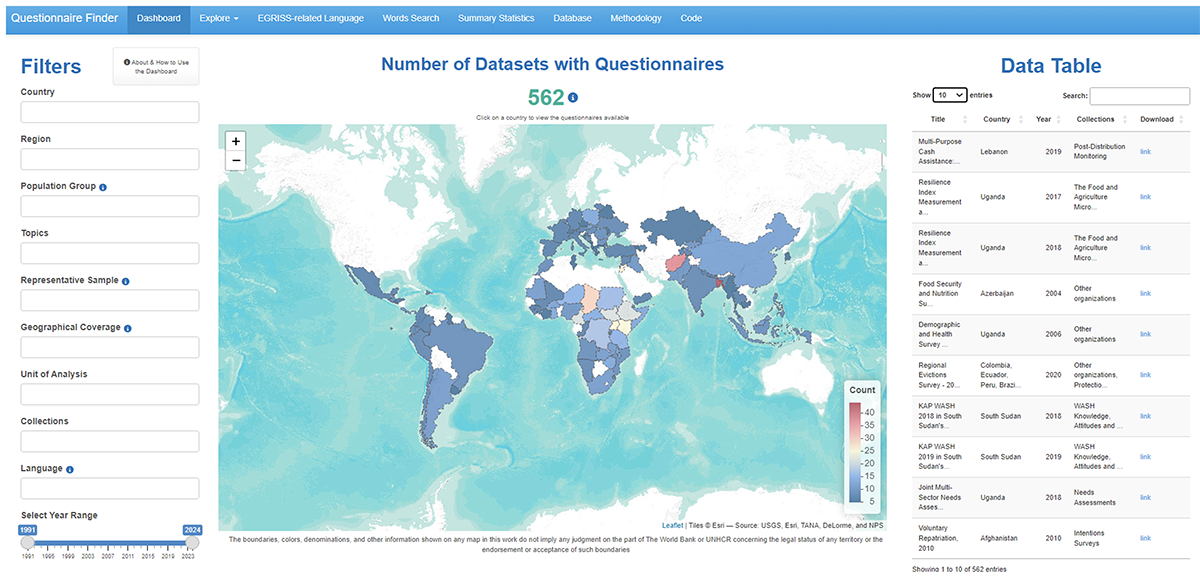By Anqi Pan, Alejandra Moreno Ramirez, Andrea Pellandra and Paddy Brock
According to the latest UNHCR Global Trends report, 1.5% of the global population is currently forcibly displaced. Governments across the globe continue to respond to this unprecedented challenge through humanitarian assistance, development programs, and policy frameworks aimed at supporting those affected. However, effective action and policies require up-to-date, high-quality, and accessible socioeconomic data, not only on people forced to flee but also on the communities in which they live. Disaggregating data on the Sustainable Development Goals (SDGs) by displacement status is key to the Agenda 2030 commitment to Leave No One Behind.
Challenge: Questionnaire Accessibility
Efforts to address these data challenges are underway, as governments and national statistical offices, working with international partners, are increasingly expanding their national surveys to include refugees, internally displaced persons (IDPs), and stateless people. This process is being supported by partnerships catalyzed by the Global Compact on Refugees. A key achievement has been the implementation of the Expert Group on Refugees, IDPs and Statelessness Statistics (EGRISS) international recommendations for statistics on refugees, IDPs, and stateless people by more than 50 national authorities.
To enable responsible data dissemination and reuse, and therefore to maximize the value of the data it collects, UNHCR has developed a Microdata Library (MDL) with support from the World Bank UNHCR Joint Data Center on Forced Displacement (JDC). As of October 2024, it hosts 864 datasets and their corresponding metadata on the needs and living conditions of those affected by forced displacement, covering a range of topics, including health, food security, and education. Many of these UNHCR MDL dataset listings include the survey questionnaires used for their collection. However, this growing bank of household survey questionnaires that have been used in forced displacement contexts is a little known and underutilized resource.
Discovery: Questionnaire Dashboard
To increase the accessibility of these questionnaires, the JDC, in support of the UNHCR microdata curation team has built an automated data processing pipeline to assess and label these questionnaires, and a dashboard for their interactive exploration. This enables users to search and filter questionnaires by various features, including country, year, population type (e.g. refugee, e.g. IDP), topics covered (e.g. nutrition, e.g. jobs), and whether the questionnaire is available in English. The text of the questionnaires is searchable in the dashboard, which means users can identify specific content (for example, language likely to be used when following EGRISS recommendations on identification approaches). The result is an openly available dashboard that allows anyone to explore, search, and access household survey questionnaires available on the UNHCR MDL.

Researchers often aim to compare data sourced from surveys focusing on different populations, time periods, or countries, but differences in the formulation of questions across surveys can complicate these comparisons. Moreover, previous work on disaggregation of SDG indicators by forced displacement, highlights the difficulty of compiling SDG indicator data for forcibly displaced persons over time and across different geographical areas. This makes a single repository of questionnaires that have been used in forced displacement contexts particularly useful, especially when comprehensive metadata is available with them to support the design of new surveys.
Impact
Consistency and quality: re-using and adapting standardized questionnaire modules and questions increases methodological consistency between studies, enabling robust comparison between them. Transparent reporting on the re-use and adaptation of standardized questionnaire components also builds trust in the quality of data.
Cost effectiveness: re-using existing questionnaires also saves the time and resources that would otherwise be spent on developing and testing new survey instruments from scratch.
Research and engagement: increasing the discoverability and accessibility of questionnaires to researchers enables methodological studies, including participatory design efforts with displaced individuals and communities. Such research could lead to the improvement of standardized approaches to data collection in forced displacement contexts.
We are launching the questionnaire explorer at the UN World Data Forum (UNWDF), which convenes global communities of practice on inclusive data and statistics for sustainable development. This work complements the knowledge exchange on displacement planned as part of UNWDF 2024 in Medellín, which range from tackling data quality challenges for children on the move to best practices for monitoring mixed migration, as well as knowledge exchange on producing inclusive statistics on migration, displacement and statelessness. We look forward to the discussions and to hearing your feedback!
